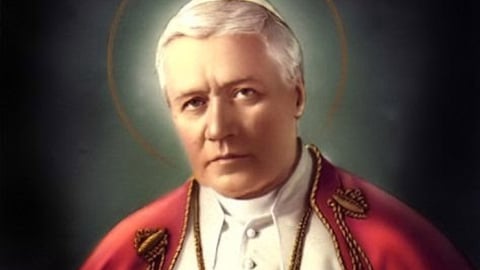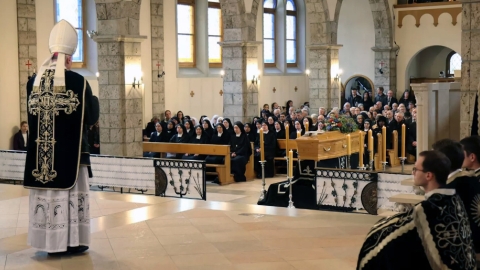Blaise Pascal Still Speaks

Latin epitaph of Blaise Pascal in the church of Saint-Étienne-du-Mont, Paris
Blaise Pascal, the 17th century French Catholic polymath, received a cascade of commemorations, academic studies, and even papal praise throughout 2023 in honor of the fourth centenary of his birth. As discussed previously on this site and in a review article on FSSPX.News, Pascal remains a seminal figure in the history of Christianity since he placed the love of God above all else in a world set on a rapid course toward secularization. His life and writings have enduring relevance for our own day.
A Man at the Dawn of Modernity
Born in 1623, Pascal entered a European world which, on the one hand, was still reeling from the aftereffects of the Reformation while, on the other, had yet to be rocked fully by the intellectual and political upheavals of the Enlightenment. Pascal’s 39 years on earth took him from being lauded as one of the true scientific geniuses of his day to devolving into what he regarded as “a man of the world,” before embracing an austere form of Catholicism that would embroil him in a fierce theological controversy concerning grace and free will.
While this tripartite division of Pascal’s life is debatable (he continued to engage in scientific work well into his period of religious fervency), the whole of his written corpus unveils a man keenly aware that the classical conception of the universe, rooted in Aristotelian science and Ptolemy’s cosmic model, had started to give way to the so-called Scientific Revolution. Regardless of the truth or falsity of this new science, some of Pascal’s contemporaries believed it called into question God’s role in creation. Contemporaneous with these developments were intellectual currents that sought to sweep away the entire classical patrimony and, by extension, the Church’s authority over politics and society. As Pascal would acknowledge repeatedly in his later wrings, might not right orders the modern world.
Pascal accepted many of the scientific discoveries of his day, even those that upset segments of the Catholic Church, though he remained open—as all good men of science should—to the possibility that the accepted views of today could be replaced by fresh insights tomorrow. No amount of protestation or wishful thinking, for instance, could restore the earth to the center of the universe or resurrect nature’s abhorrence of vacuums (an axiom of classical science that Pascal himself disproved). At the same time, any attempt to drive God out of the universe based on science remained anathema. Man’s desire for a “godless” world was rooted in his concupiscence or self-love, not a perfected understanding of a supposed infinite universe.
Pascal’s later turn toward the condemned movement known as “Jansenism” was not, as some later Enlightenment thinkers would have it, a simple anti-intellectual revolt inspired by Pascal’s well-documented physical maladies. Pascal never abandoned his critical faculties, particularly when sparring with the Jesuits over moral theology and predestination (the doctrinal point at the heart of the Jansenist movement). Moreover, as noted, scientific questions never fell fully out of his purview. What he came to find, and struggled to convey up to his last days, was the imperative to seek God without distraction from the often-transient conclusions of the human intellect.
Love of God Above All
While Pascal’s association with Jansenism and its attendant controversies is well known, less regarded in the Anglophone world—perhaps due to a dearth of in-print translations—are his Lettres provinciales (Provincial Letters), a series of pseudonymous epistles directed against the moral casuistry employed by segments of the Jesuit order. Pascal, at points, playfully presented the lengths certain Jesuit confessors went to salve their penitents’ consciences through dubious distinctions. Most of the time, however, the Letters draw from real-world examples that he regarded as scandalous (e.g., “It would be usury to make a profit from those to whom one lends if one demanded it as legally due; but if one demands it as due out of gratitude, it is not usury”). In the centuries following Pascal’s death, churchmen and scholars questioned how widespread the problem of moral laxity was in the 17th-century Church. Whatever the final verdict on the past, there is no denying its ubiquity today.
Pascal could see, far better than his contemporaries, the dangerous temptation for the Church to make peace with the world in the name of remaining “relevant.” While the Jesuits and other pockets of the Church spoke sympathetically about the need to meet people where they are—regardless of how mired in sin—in order to elevate them to holier lifestyles, Pascal argued that the price of these concessions was the Gospel itself. This does not mean that Pascal believed the Church can only be occupied by saints; but every professing Catholic is required to labor under the unmitigated demands of the moral law, seeking forgiveness with true contrition when they fall and praying continually for God’s efficacious grace.
Both the Letters and Pascal’s great (albeit incomplete) apologia for the Christian religion, the Pensées, are shot through with the call to love God above all else. A summary of Pierre Manet’s recent work on Pascal, Pascal et la proposition chrétienne (Grassett 2003), published on FSSPX.News, framed Pascal’s outlook as such: “The main issue in human life for the Christian lies in the relationship of men to God, and not in the relationship of men to each other.” Human relationships, according to Pascal, are often dictated by societal conventions that should typically be respected for the purposes of good order, but they can never supersede true love of neighbor that comes only through charity, that is, the love of God. It is a perversion to accept attitudes and lifestyles that are an affront to God in the name of “love.”
Pascal’s Continuing Relevance
In the brief sketch of Pascal’s life and thinking already presented, Pascal’s continuing importance should be obvious. Even if his portrait of the Jesuits was tilted, he saw past the all-too-human justifications for moral permissiveness to the reality that it imperiled men’s souls. As for his approach to science and the philosophical turns that would yield the Enlightenment, what might be called Pascal’s tempered openness to these ideas—even for the purposes of criticizing them—offers a model of how to remain Christian without falling prey to anti-intellectualism. While it is fair for Catholics today to question how ready Pascal was to distance himself from the Thomistic-Scholastic tradition (built as it was on classical thought), he understood that a scientific method committed to metaphysical neutrality remained both incomplete and unthreatening to faith in God.
As a further testament to Pascal’s relevance, academics—regardless of confessional alignment—have used the recent quadricentennial of his birth to produce both a new complete edition of his works and numerous philosophical studies. For English readers, the French professor Antoine Compagnon’s 2020 series of 40 pithy radio lectures, A Summer with Pascal, has just been translated and published by Harvard University Press. Though hardly a confessing Catholic, Compagnon proves himself a diligent reader of Pascal’s oeuvre by remaining sensitive to what remained central throughout Pascal’s abbreviated sojourn: the love of God.
God’s centrality in our own lives is a difficult question to explore alone. One need not accept Pascal’s extreme asceticism nor his misplaced alignment with Jansenism to remain open to what he teaches about our misery without God. All the conveniences promised by modern technology; all the pleasantry presented under the guise of liberal tolerance; all the comforting distractions delivered by mass entertainment; and all the spiritual solace offered by pious rhetoric cannot numb us the truth of the “one thing needful” that Our Lord revealed 2,000 years ago.
Pascal saw what so many of us cannot—and for that alone he remains as relevant as ever.





